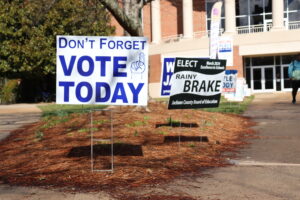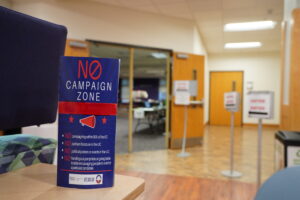Election season is upon us and with that “vote for me” signs have started making their appearance.
But the election isn’t until November 5, so why is voting starting in February?
Primary elections are hosted every election cycle as a “pre-election”. Each party, mainly the Republican and Democratic parties, have many candidates running against each other aiming for a spot on the general election ballot in November.
In a nutshell, the primary elections thin the candidate pool by party. 
“It’s the way we whittle down the field,” said Chris Cooper, a political science professor at WCU. “In many cases it’s the only election that really matters. A decreasing number of general elections are competitive whereas the primaries are very competitive.”
“The primaries are where all the action is,” Cooper said.
There are three types of primaries. Open primaries allow any registered voter to cast a vote, closed primaries allow only voters registered with the party to vote, and semi-closed primaries allow those registered under the party and those identified as “independent” to vote.
With a limited number of people eligible to vote in the different primaries, the weight of a vote is heavier than in the general election where everyone’s votes are counted, no matter the party affiliation.
Jessica Hayden is a political science professor that specializes in Congress, representation and gender and political communication. She points out the importance of voting in primary elections.
“Primary voting is so important because very few people vote in the primaries even in big elections,” Hayden said. “Often turnout is ten or fifteen percent. Local primary elections are sometimes won and lost by a handful of votes. So, while folks tend to ignore primaries and smaller elections, each individual vote matters a lot more. This is where folks can really make a difference in their communities.”
The last election cycle in 2023 showed the importance one voter can have in a race. 
The Independent Tribune, later confirmed by the State Board of Elections, declared the race for mayor of Mount Pleasant, North Carolina was decided by one vote. Tony Lapish defeated incumbent W. Del Eudy with a final vote count of 194 against 193 after several recounts.
Although it was a general election, not a primary, the fact still stands that one voter was the deciding factor in who was going to lead Mount Pleasant. The same can happen in Jackson County.
Hayden says that those who tend to vote in primaries normally lean to the extreme sides of their political parties, thus placing candidates on the general election ballots that are not as representative of the general population.
This year, there are many positions on the ballots ranging from President of the United States to the Board of Education of Jackson County.
The Jackson County Board of Elections website has a list of all positions on the ballot and those registered to be on the ballot this election cycle for every county in North Carolina.
WCU has the special opportunity of having a polling center in the University Center each election cycle.
To vote in the 2024 election, North Carolina voters will have to show photo ID that shows an accurate photo and name that matches the name registered. The address on the form of ID does not have to match the registration records.






